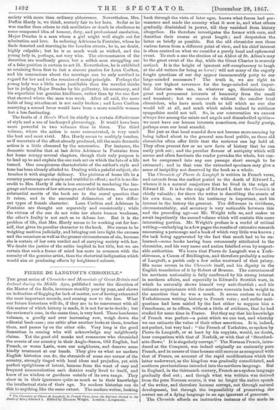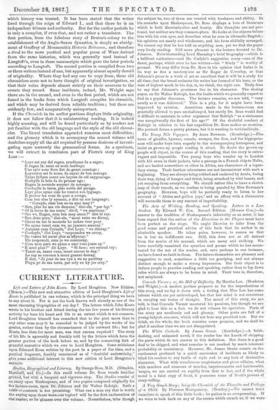PIERRE DE LANGTOFT'S CHRONICLE.* THE great series of Chronicles and
Memorials of Great Britain and Ireland during the Middle Ages, published under the direction of the Master of the Rolls, increases steadily year by year, and shows no indication of flagging for lack of matter, nor of having exhausted the most important records, and coming now to the less. What our future historians will do, if they are to be conversant with all this matter of which history is made, it is not for us to decide ; but the reviewer's case, in the mean time, is very hard. These handsome volumes, a goodly and ever increasing row, weigh down the editorial book-case; one critic after another looks at them, touches them, and passes by on the other side. Very long is the good Samaritan in coming who will acknowledge any neighbourly claims. Yet the good old monks and romancers who chronicled the events of our country in their Anglo-Saxon, Old English, bad French, or •worse Latin, were our neighbours, and deserve some kindly treatment at our hands. They give us what no modern English historian can do, the chronicle of some one corner of the country, strongly tinged with local ideas and prejudice, yet.with perfect uprightness of intent, because from the want of easy and frequent Communication each district really lived to itself, and knew of no wisdom or goodness outside of its own range. They show us in their ignorance quite as much as in their knowledge the intellectual state of their age. No modern historian can do this to anything like the same extent. The modern writer, looking
* The Chronicle of Pierre de Lasgtofl,fn French Verse, from the Earliest Period to the Death of Kiai Edward 1. Edited by Thomas Wright, London : Longmans.
back through the vista of later ages, knows what forces had per- manence and made the country what it now is, and what others gradually diminished in power, till they vanished from history altogether. He therefore investigates the former with care, and describes their course at great length ; and despatches the latter as briefly as possible. But the old chronicler sees these various forces from a different point of view, and his chief interest is often centred on what we consider a purely local and ephemeral event. To such a one the election of an Abbot of St. Alban's may be the great event of the day, while the Great Charter is scarcely noticed. It is the height of ignorant self-complacency to laugh at the old writers for being so borne; will not many of the eagerly fought questions of our day appear immeasurably petty to our large-minded successors ? The truth is, we are right to keep our highest reverence for the large-minded and impar- tial historian who can, in whatever age, discriminate the great and permanent interests of humanity from the small and transient; but we cannot do without the smaller local chroniclers, who have much truth to tell which no one else would tell at all, and much which minds trained to sublimer sympathies could not tell. So, in our conversation we cannot always live among the saints and angels and disembodied spirits— we must have our human interests sometimes, our family gossip, perhaps even our local scandal.
But just as that local scandal does not become more amusing by being talked about to the general non-local public, so these old chronicles often offer little• that the reviewer can lay hold of. They often present few or no new facts of history that he can easily pick out ; and the peculiar flavour of antiquity which will amuse and often fascinate the reader pervades the whole, bat can- not be compressed into any one passage short enough to be extracted ; and in that case the extracted specimen may give a. sense of insipidity not deserved by the book as a whole.
The Chronicle of Pierre de Langtoft is written in French verse, and extends from the earliest period to the death of Edward L, whence it is a natural conjecture that he lived in the reign of Edward If. It is for the reign of Edward I. that the Chronicle is chiefly valuable ; for there the writer is describing the events of his own time, on which his testimony is important, and his interest in the history the greatest. The difference in vividness, circumstantiality, and accuracy is very noticeable between this and the preceding age—so Mr. Wright tells us, and makes us await impatiently the second volume which will contain this more interesting portion. Mr. Wright's preface is a model of critical writing—embodying in a few pages the results of extensive research concerning a personage and a book of which very little was known ; the task being aggravated by the fact that mach had to be un- learned—some books having been erroneously attributed to the chronicler, and his very name and nation falsified even by respect- able authorities. We learn that Pierre de Langtoft was a York- shireman, a Canon of Bridlington, and therefore probably a native of Langtoft, a parish only a few miles westward of that priory. His name occurs in the Chronicle itself, and his dignity in the English translation of it by Robert of Brunne. The correctness of his northern nationality is fully confirmed by his strong interest in northern affairs, and especially in Edward's Scottish wars, in which he naturally shows himself very anti-Scottish ; and his intimate acquaintance with the northern convents lends weight to the assertion that he was a monk. It seems curious to find a Yorkshireman writing history in French verse ; and earlier anti- quarians had been misled by the fact either to suppose him a. Frenchman, or to affirm, without a tittle of evidence, that he had studied for some time in France. But they say that his knowledge of French was perfect—a point which we can test, and whereby 'we can estimate the value of their other assertions. It is, indeed, not perfect, but very bad : "the French of Yorkshire, as spoken by Pierre de Langtoft, or at least by his copyists, would, no doubt, bear comparison with that of Norfolk, or with that of ' Stratford- atte-Bowe.' It is singularly corrupt." The Norman French, intro- duced at the Conquest, was indeed originally an eminently pure French, and in course of time became still more so as compared with that of France, on account of the rapid modifications which the latter underwent, as the kingdom was gradually consolidated, and. southern provincialisms intruded into the northern language. But in England, in the thirteenth century, French as a spoken language gradually died out ; and though what was written was derived from the pure Norman source, it was no longer the native speech of the writer, and therefore became corrupt, not through natural development, but through the impossibility of preserving the correct use of a dying language in an age ignorant of grammar.
The Chronicle affords an instructive instance of the mode in which history was treated. It has been stated that the writer lived through the reign of Edward I., and that there he is an independent witness and authority. But for the earlier periods he is only a compiler, if even that, and not rather a translator. The first portion, from the fabulous story of Brutus's colony to the establishment of the Anglo-Saxon dynasties, is simply an abridg- ment of Geoffrey of Monmouth's .Historia Briton um, and therefore a rival to the more poetical and popular poem of Waco derived from the same historian, which was generally used instead of Langtoft's, even in those manuscripts which gave the later periods according to Langtoft. The second portion is compiled from two or three writers instead of one, but apparently almost equally devoid of originality. Where they had any one to copy _from, these old .chroniclers seem not to have thought of original investigation, so that their value depends almost strictly on their nearness to the .events they record. Some incidents, indeed, Mr. Wright says there are in the second, and even in the first period, which are not sound in the books from which Langtoft compiles his chronicle, and which may be derived from reliable tradition ; but these are evidently few, and comparatively unimportant.
If the Chronicle in its earlier portions displays little originality, it does not follow that it is uninteresting reading. It is indeed highly amusing, and will be found particularly so by readers not yet familiar with the old language and the style of the old chroni- oles. The literal translation appended removes most difficulties ; and the glossary which is to accompany the second volume will doubtless supply all the aid required by persons desirous of investi- gating more narrowly the grammatical forms. As a specimen, we will extract in conclusion part of Pierre's story of King Lear : —
"Leyr eat ray del rogue, prudhome In e sages; II regna lx. aunz en aoun heritage.
line cyte sour Sore fist do grant coustage ; Laycestro eat le noun, fu ceynt de bon =rage.
Treys fyllyes sount see heyres de eel seygnurage. Cornylle la bele fa de primer ago ; Ragan la secunde aceyme de corsage ; Cordeylle la terce, plus noble del parage. Leyr plus ayrue cola ke trestot son lygnage.
E prover lea vent de quer e corage, Corn ben cies ly eyment, e dist en son language ; " Cornyle, cam ben as-tu ame may ?"
"Sire, plus ke ma vie demene," dist-ele, "par fay."
"Of la tome de ma terra," dit-il, "we marieray."
"Ore we, Raga; cum ben moy amez ?" dist le ray.
"Ben douz pare," dist-ele, "snout veirs we dirray, "Chose en tut le mounde ke unkes veer poay "Ne ayme taunt cum we, no jammes ameray."
" Autaunt cum Cornyle," dist Leyr, "we durray."
" Cordeyle," dist Leyr, "respoundre we orray, "De vostre lel amur plus m'affyeray."
Ele respoundi, cum je vs counteray.
"Coin moo pare vs eyme e ame touz jours ay."
"E nent plus?" dit Leyr. "Si face; ore entend toy; "Taunt as, taunt vans, taunt amour to day."
Le ray se corouce k moat graunt desray,
E dist, "Tia jour de ma vye l vs no partiray - Playa IA do ma terre, par cely on ky jeo Cray."































 Previous page
Previous page